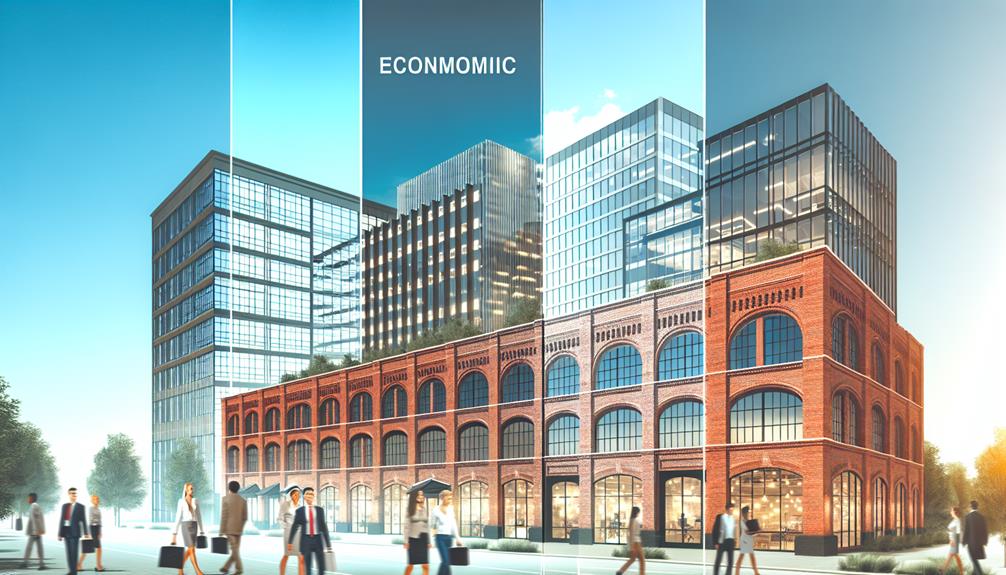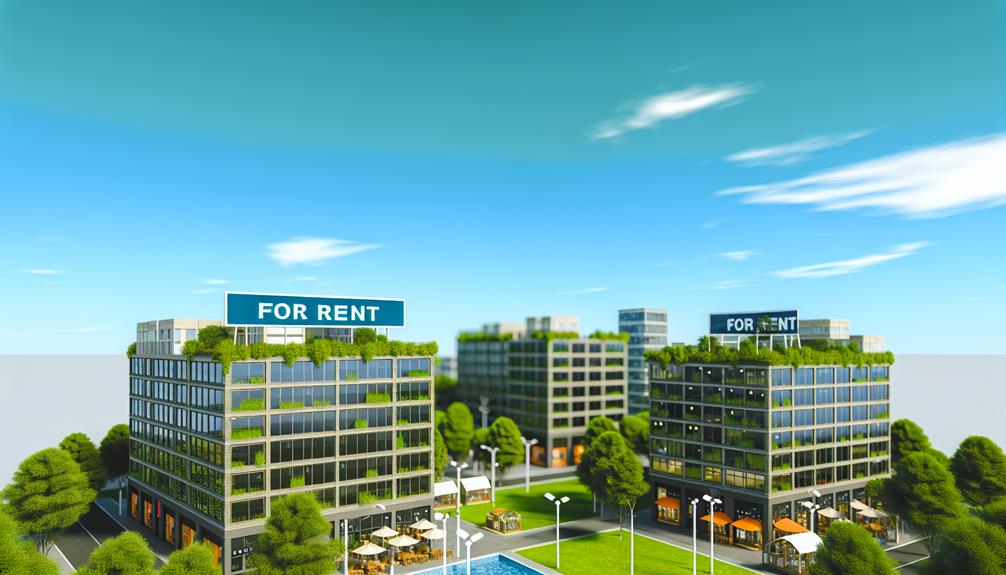Finding affordable business buildings for rent involves evaluating your specific office space needs and establishing a realistic budget. Consider various types of spaces, including co-working areas and private offices, to maximize cost-effectiveness. Location is key; choose a site that enhances your company image while remaining accessible to clients and employees. Engage with local business communities and utilize online platforms to uncover hidden rental options. Don't forget to negotiate lease terms to secure the best deal. For further insights on securing your ideal office space without breaking the bank, additional strategies can enhance your search success.
Key Takeaways
- Identify your specific office space needs, including size, location, and required amenities to narrow down options effectively.
- Explore co-working spaces for cost-effective solutions that encourage collaboration, especially for startups and small businesses.
- Utilize online platforms and local business networks to discover hidden rental options and negotiate favorable lease terms.
- Evaluate the location's accessibility and nearby amenities to enhance employee satisfaction and company image.
- Conduct thorough research on comparable properties to strengthen your negotiation position and understand market trends.
Understanding Your Office Space Needs

Frequently, businesses underestimate the importance of clearly defining their office space needs, which can lead to costly mistakes and inefficiencies. A well-considered office layout not only maximizes the use of space but also enhances employee productivity and overall workplace satisfaction. Understanding the specific requirements of your team, including the number of employees, types of workstations, and collaborative spaces, is vital in creating an environment that fosters engagement and effectiveness. Additionally, considering the current job market can inform your choices regarding office space, as businesses may need to adapt to evolving work trends and employee preferences, such as flexible work arrangements.
Moreover, acknowledging the distinctive culture of your organization can guide the design of your office space. For example, open layouts may promote collaboration, while designated quiet areas can support focused work. It's imperative to evaluate the flow of movement within the office, ensuring that it facilitates communication and teamwork while providing areas for privacy.
Investing time in this initial assessment can yield significant returns. A thoughtfully designed office can lead to reduced turnover, increased employee morale, and heightened productivity. By prioritizing your office space needs, you build a foundation for a thriving workplace that employees feel proud to be part of, ultimately contributing to the success of your business.
Budgeting for Your Rental
When starting on the journey to find an affordable business building for rent, establishing a thorough budget is essential to guarantee financial sustainability and long-term success. A well-crafted budget not only helps you identify what you can afford but also empowers you to navigate the complexities of the rental market with confidence. To enhance your search, consider exploring local business opportunities that may lead to cost-effective rental options. Begin by analyzing current rental market trends to understand average pricing in your desired area. This knowledge will provide a baseline for your budget and allow you to set realistic expectations. Consider incorporating cost saving strategies, such as negotiating lease terms or opting for less conventional spaces that may offer lower rates.
Additionally, don't forget to account for ancillary costs such as utilities, maintenance, and potential renovations. These expenses can greatly impact your overall financial picture, so it's vital to include them in your budget.
Popular Types of Office Spaces

Understanding the various types of office spaces available for rent is a key component of making an informed decision that aligns with your budget and business needs. Among the most popular options are co-working spaces, which foster collaboration and community by allowing multiple businesses to share a common environment. This setup is ideal for startups and freelancers seeking a dynamic atmosphere without the overhead costs. Additionally, businesses looking for flexibility may benefit from exploring remote customer service job opportunities that can complement their office space needs.
For those requiring more privacy, private offices offer a dedicated space to focus and conduct meetings. Executive suites provide an upscale option, combining luxury with functionality, perfect for established professionals needing a prestigious address.
Virtual offices cater to businesses that primarily operate online. They provide a professional business identity without the need for physical space, allowing you to maintain flexibility and reduce costs.
Additionally, shared facilities present an innovative solution, granting access to amenities such as conference rooms and reception services without the commitment of a long-term lease. Finally, flex spaces adapt to your business's changing needs, offering a blend of open areas and private offices, making them a versatile choice for growing companies. Each option presents unique advantages tailored to different business models.
Tips for Finding Affordable Options
Finding affordable office space requires a strategic approach that considers both budget constraints and business requirements. Begin by identifying your specific needs, such as the size of the space, location preferences, and essential amenities. This clarity will help you focus on options that align with your goals. Additionally, consider exploring venues that offer diverse facilities and event spaces, such as those found at the Central Bank Sporting Complex, as they can provide unique opportunities for networking and collaboration.
Explore co-working spaces and shared offices, which have gained popularity due to their cost-effectiveness and collaborative environments. These options often provide flexibility in lease terms, allowing businesses to scale up or down as needed. Additionally, co-working spaces typically include utilities and internet access, reducing unexpected expenses.
Networking with local business communities can uncover hidden gems in office rentals. Often, recommendations from fellow entrepreneurs lead to opportunities not advertised publicly. Utilize online platforms dedicated to office space listings, filtering results based on your budget and requirements.
Lastly, be open to negotiation. Many landlords are willing to discuss terms, especially in competitive markets. By considering these tips, you can find an affordable office space that not only meets your financial constraints but also fosters a sense of belonging for you and your team.
Evaluating Location and Amenities

Evaluating location and amenities is a vital step in securing an affordable office space that aligns with your business objectives. The right location not only enhances your company's image but also plays an essential role in attracting and retaining clients and employees. Proximity considerations are important; being near key clients, suppliers, or industry hubs can greatly impact your business operations. For instance, just as specialized care services at facilities like Kings Harbor Multicare Center can improve patient outcomes, the right office location can boost your business effectiveness.
Moreover, accessibility factors must not be overlooked. Confirm that the space is easily reachable via public transport and major roadways, allowing both employees and clients to navigate seamlessly. Ample parking facilities and pedestrian-friendly environments can further enhance the desirability of your office location.
In addition to location, consider the amenities offered. Access to high-speed internet, conference rooms, and supportive services can create a productive work environment. Local facilities such as eateries, banks, and gyms can enrich your team's daily experience, fostering a sense of community and belonging.
Ultimately, a thorough evaluation of location and amenities can help you find an office space that not only meets your budget but also supports your overall business growth and employee satisfaction. Take the time to assess these elements carefully for a successful long-term investment.
Negotiating Your Lease Agreement
Negotiating your lease agreement is a critical component of securing an affordable business building that aligns with your operational goals. Understanding the intricacies of lease terms can empower you to craft an agreement that supports your business needs while minimizing expenses. Begin by conducting thorough research on comparable properties to establish a solid baseline for your negotiations.
Employ effective negotiation strategies, such as starting with a clear budget and knowing your non-negotiables. Articulate your requirements and be prepared to present them confidently. This not only demonstrates your seriousness but also fosters a collaborative atmosphere with the landlord. Don't hesitate to request modifications to terms that seem unfavorable; landlords often expect some level of negotiation.
Consider the duration of the lease, renewal options, and potential rent increases. These factors can greatly impact your long-term financial commitments. It is also wise to include clauses that allow for flexibility, such as subleasing opportunities or the right to make alterations.
Ultimately, a well-negotiated lease agreement can establish a foundation for your business success and foster a positive relationship with your landlord, ensuring a sense of belonging in your chosen office space.
Frequently Asked Questions
What Are Common Lease Terms for Office Spaces?
Common lease terms for office spaces typically include lease duration, which can range from one to ten years, depending on the tenant's needs and the landlord's preferences. Rental negotiations often focus on the flexibility of terms, including renewal options and escalation clauses. Understanding these factors is essential for businesses seeking stability and growth. A well-structured lease can foster a sense of belonging, ensuring that tenants feel secure in their operational environment.
How Do I Determine the Right Office Layout?
Determining the right office layout is essential for optimizing office design and enhancing workspace efficiency. Begin by evaluating your team's needs, considering collaboration areas, individual workspaces, and communal zones. Prioritize flexibility to adapt to changing demands, fostering a sense of belonging among employees. Incorporate ergonomic furniture and technology to promote productivity. Ultimately, an effective layout not only supports operational goals but also cultivates a positive work environment that resonates with your organizational culture.
Are Utilities Typically Included in Office Rentals?
When evaluating office rentals, it is crucial to understand whether utilities are included in the rental agreements. Typically, providers may offer a utilities breakdown outlining what is covered, such as electricity, water, and internet access. This inclusion can greatly impact your overall budgeting and operational costs. As a result, thoroughly reviewing the lease terms and discussing utility provisions with your landlord can help guarantee that you secure a space that meets your business's needs effectively.
Can I Sublet the Office Space if Needed?
Subletting options can vary greatly based on the specific lease agreements in place. It is essential to review your lease carefully, as many landlords impose restrictions on subletting to maintain control over their properties. If permitted, subletting can provide flexibility and financial relief during changing periods. Engaging in open communication with your landlord about your intentions will help foster a collaborative environment, ensuring that you navigate the process smoothly while adhering to all necessary regulations.
What Are the Tax Implications of Renting Office Space?
Renting office space can offer significant tax advantages, particularly through deductions eligibility for business expenses. Under rental agreements, businesses may deduct rent payments, utilities, and maintenance costs from their taxable income, reducing overall tax liability. It's crucial to maintain detailed records and guarantee compliance with tax regulations to maximize these benefits. Consulting a tax professional can provide tailored advice, ensuring businesses fully understand their entitlements and responsibilities regarding rented office space.

